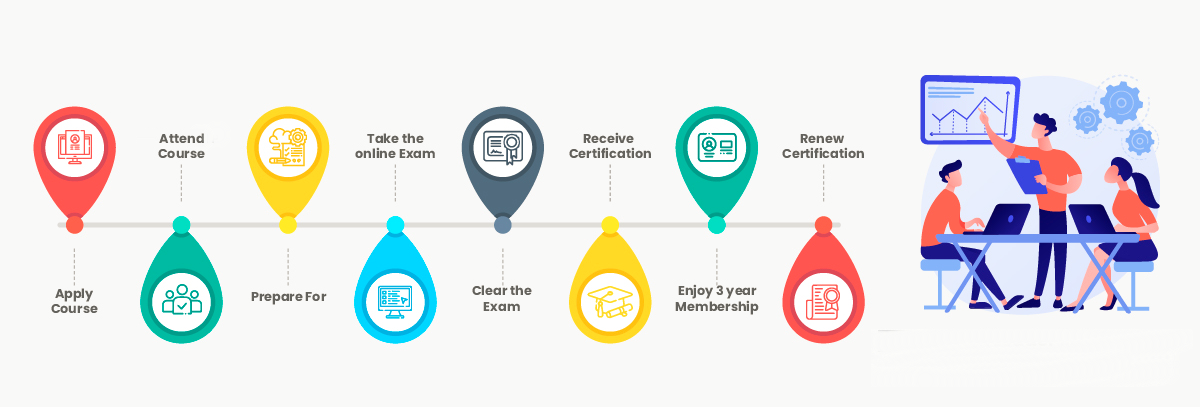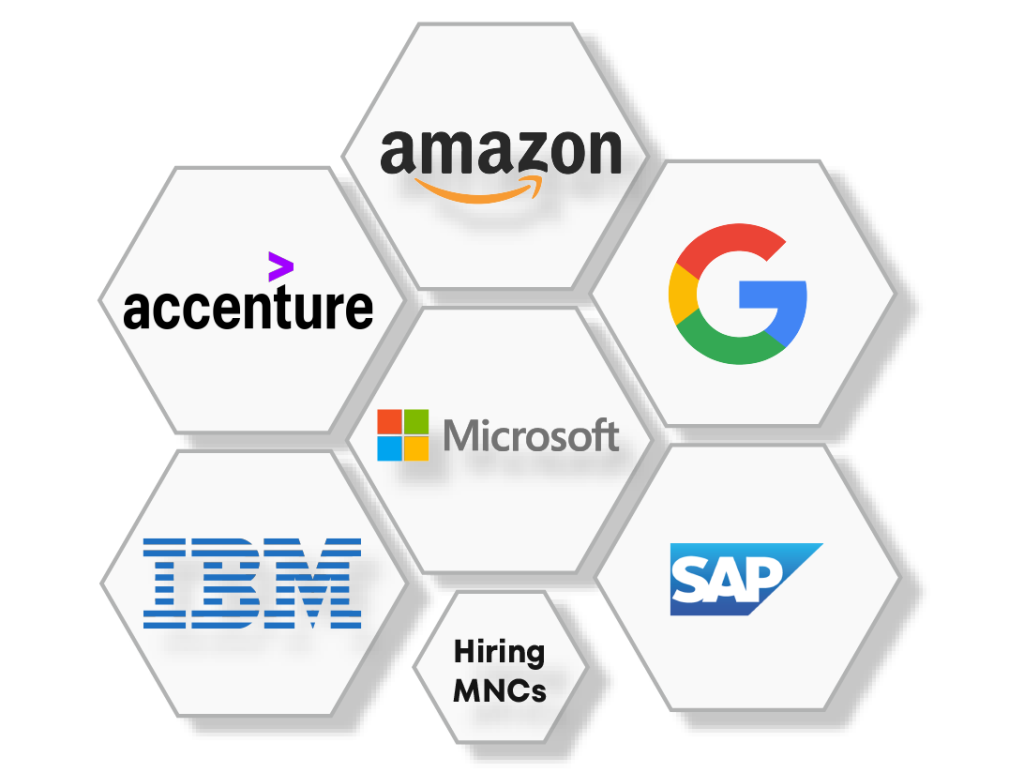
Sambodhi and Education Nest provide a comprehensive Master DevOps Engineer training program that covers a range of DevOps tools, such as Git, Jenkins, Docker, Ansible, Terraform, Kubernetes, Prometheus, and Grafana. The hands-on course is designed to certify you as a practitioner in Continuous Development, Configuration Management, Continuous Integration, and Continuous Monitoring. Taught by industry professionals and accredited by the global DevOps community, the curriculum incorporates real-world projects and hands-on practice to equip you with skills that meet current employer demands. Upon completion of the course, you’ll be equipped with knowledge and skills to utilize popular software such as Git, SVN, Docker, and Nagios. Mentees also gain access to a carefully curated collection of real-world experiences to enhance their learning.
Application Deadline: Sept 10, 2023
Upskill for Your Dream Job
Sambodhi and Education Nest offers a comprehensive Master DevOps Engineer Training Course designed to equip individuals with the necessary skills and knowledge in this rapidly evolving field. With a focus on live project-based training, participants gain practical experience while learning from industry experts with over 10 years of experience. The instructors at Sambodhi and Education Nest have developed unique teaching styles to ensure aspiring candidates can master the intricacies of DevOps. The course covers a wide range of topics, including continuous integration and deployment, infrastructure automation, containerization, and monitoring. By the end of the training, participants will have the confidence and expertise to implement DevOps practices, streamline software development and deployment processes, and enhance collaboration and efficiency within their organizations.



Instructor-led DevOps Engineer live online Training Schedule
May 15th – Weekend
Sept. 16th – Weekend
Why enroll for DevOps Engineer Certificate Training Course?


DevOps is poised for robust growth, with a projected 22% increase in employment for software developers by 2029. The DevOps market is expected to reach $10.31 billion by 2023, with a 24.7% CAGR.

DevOps professionals are in high demand across finance, healthcare, e-commerce, and IT industries, with top MNCs like Google, Amazon, Microsoft, and IBM investing in DevOps for improved software development.

DevOps professionals experience substantial salary growth due to high demand, with average salaries of around $110,000 and potential earnings exceeding $200,000. Salaries can increase up to 20%.
DevOps Training Course Benefits
DevOps course by Sambodhi and Education Nest is essential for individuals looking to pursue a career in the fast-growing DevOps field. The program equips individuals with hands-on experience with various DevOps tools, preparing them to become certified practitioners in Continuous Development, Configuration Management, Continuous Integration, and Continuous Monitoring. Successful completion of the course can lead to lucrative job opportunities as a DevOps Engineer in top-tier organizations. The program is designed to give individuals a competitive edge in the job market, helping them land high-paying jobs and positions as DevOps Engineers.

Annual Salary

Hiring Companies
Want to become a DevOps Professional?
Why DevOps Engineer Certificate Training Course from Education Nest






DevOps Skills Covered
DevOps Training Course Syllabus
DevOps Training Projects

DevOps projects have become increasingly vital in the retail industry, transforming the way companies operate and deliver software solutions. In the retail sector, DevOps practices enable organizations to enhance their agility, streamline software development and deployment processes, and improve customer experiences. By adopting continuous integration and delivery, retailers can quickly introduce new features, updates, and bug fixes to their e-commerce platforms, mobile applications, and inventory management systems. DevOps also facilitates seamless collaboration between development and operations teams, ensuring faster time to market and reducing downtime. With efficient DevOps implementation, retailers can optimize their online presence, offer personalized shopping experiences, and adapt to rapidly changing consumer demands, ultimately driving business growth and customer satisfaction.

DevOps projects play a vital role in the IT industry, revolutionizing software development and delivery processes. By promoting collaboration between development and operations teams, DevOps aims to streamline workflows, enhance communication, and improve efficiency. These projects involve automating infrastructure provisioning, configuration management, and continuous integration and deployment pipelines. DevOps practices enable organizations to achieve faster time-to-market, frequent and reliable software releases, and greater stability in production environments. Additionally, by implementing practices such as infrastructure as code and containerization, DevOps projects enable scalability, flexibility, and cost optimization. In the rapidly evolving IT industry, DevOps projects are essential for organizations to stay competitive, drive innovation, and deliver value to their customers.
DevOps Training Description
The DevOps course offers comprehensive training to individuals seeking to gain expertise in this dynamic field. Participants will learn the principles and practices of DevOps, including continuous integration, continuous delivery, and infrastructure automation. The course covers various tools and technologies used in DevOps environments, such as Git, Jenkins, Docker, and Kubernetes. Through hands-on exercises and real-world projects, students will develop practical skills in setting up CI/CD pipelines, managing infrastructure as code, and implementing containerization. Experienced instructors guide participants throughout the course, providing valuable insights and best practices. By completing the DevOps course, individuals will be equipped with the knowledge and skills necessary to drive efficient software development processes and enhance collaboration within organizations.
The objectives of the DevOps course are as follows:
Learning a DevOps course offers several compelling reasons to pursue this field. Here are some key points on why one should consider learning DevOps:
Enhanced Career Prospects: DevOps professionals are in high demand, and acquiring DevOps skills opens up a wide range of job opportunities in the IT industry.
Efficient Software Development Lifecycle: DevOps practices streamline and automate software development processes, leading to faster, more reliable releases and improved overall efficiency.
Collaboration and Communication: DevOps emphasizes collaboration between development, operations, and other teams, fostering better communication and teamwork.
Continuous Integration and Delivery: DevOps enables the implementation of continuous integration and delivery (CI/CD) pipelines, allowing for rapid and frequent software releases.
Infrastructure Automation: Learning DevOps equips individuals with the knowledge to automate infrastructure provisioning, configuration management, and deployment processes.
Scalability and Flexibility: DevOps leverages containerization and cloud technologies, enabling organizations to scale their applications and infrastructure efficiently.
Improved Product Quality: DevOps practices focus on testing, monitoring, and feedback loops, leading to higher-quality software products and improved customer satisfaction.
Agile and Agile-like Methodologies: DevOps aligns well with agile methodologies, promoting iterative development, faster feedback cycles, and adaptive planning.
Industry Relevance: DevOps has become a standard practice in many organizations, and staying updated with DevOps skills ensures professional relevance and competitiveness.
Continuous Learning and Growth: DevOps is a rapidly evolving field with new tools and technologies emerging. Learning DevOps offers opportunities for continuous learning, skill development, and professional growth.
By learning DevOps, individuals can gain a competitive edge, contribute to efficient software delivery, and advance their careers in the dynamic IT industry.
Anyone working in Operations or Development and Engineering teams can opt for a career in DevOps. Students need to have a graduate degree or professional IT diploma. Technical background and a basic understanding of Linux, web development, and Java programming are necessary.
Individuals working in the following roles will benefit the most from the DevOps Certification course:
The pre-requisites for the DevOps course are as follows:
Basic Understanding of Software Development: Familiarity with software development concepts, such as programming languages, version control, and software development lifecycle, is beneficial.
Linux Fundamentals: Basic knowledge of the Linux operating system, including command-line operations and file management, is helpful as many DevOps tools and technologies are primarily used in Linux environments.
Networking Concepts: Understanding networking fundamentals, including IP addresses, protocols, and network configuration, is advantageous for managing network-related tasks in a DevOps context.
Scripting and Automation: Proficiency in at least one scripting language, such as Python, Bash, or PowerShell, is beneficial for writing automation scripts and managing infrastructure as code.
Familiarity with Cloud Platforms: Knowledge of cloud computing platforms like AWS, Azure, or Google Cloud is useful as many DevOps practices involve deploying and managing applications in cloud environments.
Basic Understanding of Virtualization: Familiarity with virtualization technologies like VMware or VirtualBox is advantageous for comprehending containerization concepts and tools like Docker.
System Administration Skills: Having a basic understanding of system administration tasks, such as user management, file permissions, and package installation, can be beneficial for working with DevOps tools and configuring infrastructure.
In addition to the mentioned courses, Sambodhi and Education Nest offer a range of other niche courses to cater to diverse learning needs. Some of the notable courses include:
Cassandra: Learn Cassandra, a highly scalable and distributed NoSQL database, to handle large amounts of data across multiple servers while ensuring high availability and fault tolerance.
Informatica: Gain expertise in Informatica, a leading data integration and management tool, to extract, transform, and load data from various sources, enabling efficient data integration and analysis.
Teradata: Master Teradata, a powerful analytics platform used by major organizations, to store, process, and analyze large volumes of data, enabling data-driven decision-making and business insights.
OpenShift: Explore OpenShift, a containerization platform developed by Red Hat, to build, deploy, and manage applications in a containerized environment, providing scalability and flexibility.
MongoDB: Discover MongoDB, a popular NoSQL database, and learn how to store, retrieve, and manage data in a flexible and scalable manner, empowering efficient data handling.
Hadoop: Learn Hadoop, an open-source framework, and understand how to process and analyze large datasets in a distributed computing environment, enabling Big Data processing and analytics.
Data Science: Dive into the world of Data Science and learn techniques to extract insights from data, apply statistical analysis, and build predictive models to drive informed decision-making.
Salesforce: Develop expertise in Salesforce, a leading customer relationship management (CRM) platform, to manage customer data, automate sales processes, and optimize customer engagement.
WebLogic: Gain knowledge of WebLogic, an application server platform, to deploy, manage, and scale Java applications, ensuring efficient performance and high availability.
Agile using Scrum: Understand Agile principles and the Scrum framework, enhancing project management skills for efficient and adaptive project delivery.
These courses provide professionals with the opportunity to expand their skill set and stay relevant in the ever-evolving IT industry.
The DevOps course offers comprehensive training to individuals seeking to gain expertise in this dynamic field. Participants will learn the principles and practices of DevOps, including continuous integration, continuous delivery, and infrastructure automation. The course covers various tools and technologies used in DevOps environments, such as Git, Jenkins, Docker, and Kubernetes. Through hands-on exercises and real-world projects, students will develop practical skills in setting up CI/CD pipelines, managing infrastructure as code, and implementing containerization. Experienced instructors guide participants throughout the course, providing valuable insights and best practices. By completing the DevOps course, individuals will be equipped with the knowledge and skills necessary to drive efficient software development processes and enhance collaboration within organizations.
The objectives of the DevOps course are as follows:
Learning a DevOps course offers several compelling reasons to pursue this field. Here are some key points on why one should consider learning DevOps:
Enhanced Career Prospects: DevOps professionals are in high demand, and acquiring DevOps skills opens up a wide range of job opportunities in the IT industry.
Efficient Software Development Lifecycle: DevOps practices streamline and automate software development processes, leading to faster, more reliable releases and improved overall efficiency.
Collaboration and Communication: DevOps emphasizes collaboration between development, operations, and other teams, fostering better communication and teamwork.
Continuous Integration and Delivery: DevOps enables the implementation of continuous integration and delivery (CI/CD) pipelines, allowing for rapid and frequent software releases.
Infrastructure Automation: Learning DevOps equips individuals with the knowledge to automate infrastructure provisioning, configuration management, and deployment processes.
Scalability and Flexibility: DevOps leverages containerization and cloud technologies, enabling organizations to scale their applications and infrastructure efficiently.
Improved Product Quality: DevOps practices focus on testing, monitoring, and feedback loops, leading to higher-quality software products and improved customer satisfaction.
Agile and Agile-like Methodologies: DevOps aligns well with agile methodologies, promoting iterative development, faster feedback cycles, and adaptive planning.
Industry Relevance: DevOps has become a standard practice in many organizations, and staying updated with DevOps skills ensures professional relevance and competitiveness.
Continuous Learning and Growth: DevOps is a rapidly evolving field with new tools and technologies emerging. Learning DevOps offers opportunities for continuous learning, skill development, and professional growth.
By learning DevOps, individuals can gain a competitive edge, contribute to efficient software delivery, and advance their careers in the dynamic IT industry.
Anyone working in Operations or Development and Engineering teams can opt for a career in DevOps. Students need to have a graduate degree or professional IT diploma. Technical background and a basic understanding of Linux, web development, and Java programming are necessary.
Individuals working in the following roles will benefit the most from the DevOps Certification course:
The pre-requisites for the DevOps course are as follows:
Basic Understanding of Software Development: Familiarity with software development concepts, such as programming languages, version control, and software development lifecycle, is beneficial.
Linux Fundamentals: Basic knowledge of the Linux operating system, including command-line operations and file management, is helpful as many DevOps tools and technologies are primarily used in Linux environments.
Networking Concepts: Understanding networking fundamentals, including IP addresses, protocols, and network configuration, is advantageous for managing network-related tasks in a DevOps context.
Scripting and Automation: Proficiency in at least one scripting language, such as Python, Bash, or PowerShell, is beneficial for writing automation scripts and managing infrastructure as code.
Familiarity with Cloud Platforms: Knowledge of cloud computing platforms like AWS, Azure, or Google Cloud is useful as many DevOps practices involve deploying and managing applications in cloud environments.
Basic Understanding of Virtualization: Familiarity with virtualization technologies like VMware or VirtualBox is advantageous for comprehending containerization concepts and tools like Docker.
System Administration Skills: Having a basic understanding of system administration tasks, such as user management, file permissions, and package installation, can be beneficial for working with DevOps tools and configuring infrastructure.
In addition to the mentioned courses, Sambodhi and Education Nest offer a range of other niche courses to cater to diverse learning needs. Some of the notable courses include:
Cassandra: Learn Cassandra, a highly scalable and distributed NoSQL database, to handle large amounts of data across multiple servers while ensuring high availability and fault tolerance.
Informatica: Gain expertise in Informatica, a leading data integration and management tool, to extract, transform, and load data from various sources, enabling efficient data integration and analysis.
Teradata: Master Teradata, a powerful analytics platform used by major organizations, to store, process, and analyze large volumes of data, enabling data-driven decision-making and business insights.
OpenShift: Explore OpenShift, a containerization platform developed by Red Hat, to build, deploy, and manage applications in a containerized environment, providing scalability and flexibility.
MongoDB: Discover MongoDB, a popular NoSQL database, and learn how to store, retrieve, and manage data in a flexible and scalable manner, empowering efficient data handling.
Hadoop: Learn Hadoop, an open-source framework, and understand how to process and analyze large datasets in a distributed computing environment, enabling Big Data processing and analytics.
Data Science: Dive into the world of Data Science and learn techniques to extract insights from data, apply statistical analysis, and build predictive models to drive informed decision-making.
Salesforce: Develop expertise in Salesforce, a leading customer relationship management (CRM) platform, to manage customer data, automate sales processes, and optimize customer engagement.
WebLogic: Gain knowledge of WebLogic, an application server platform, to deploy, manage, and scale Java applications, ensuring efficient performance and high availability.
Agile using Scrum: Understand Agile principles and the Scrum framework, enhancing project management skills for efficient and adaptive project delivery.
These courses provide professionals with the opportunity to expand their skill set and stay relevant in the ever-evolving IT industry.
DevOps Certificate Training Course reviews
Read learner testimonials
Sachin P.
Sambodhi's trainers were highly knowledgeable. They are well-equipped with a variety of questions and topics that were clarified and discussed in a clear and concise manner. They gave me real-world scenario examples while explaining concepts. It greatly aided me in passing several technical interviews in reputable MNCs.
Ivan K.
I am extremely satisfied with this training program. The course content is excellent, and the trainers are exceptional. They made the classes engaging and interactive, greatly enhancing my understanding of the concepts. The availability of recordings for revision after the course is a significant advantage. Additionally, the lifetime access provided ensures flexibility in completing the training without time constraints. I highly recommend this course.
Keshava S.
Sambodhi is a reputable online learning platform offering diverse courses in IT, data science, cloud computing, and more. I took the professional DevOps course, which provided quality content and expert instructors. It's a reliable platform for skill enhancement. Thank you for providing such a remarkable learning experience.
Hear from our learners
Lorem ipsum dolor sit amet, consectetur adipiscing elit. Ut elit tellus, luctus nec ullamcorper mattis, pulvinar dapibus leo.
Lorem ipsum dolor sit amet, consectetur adipiscing elit. Ut elit tellus, luctus nec ullamcorper mattis, pulvinar dapibus leo.
Lorem ipsum dolor sit amet, consectetur adipiscing elit. Ut elit tellus, luctus nec ullamcorper mattis, pulvinar dapibus leo.
Like what you hear from our learners?
Creating Epic Presentations: Communicating Powerful Ideas reviews
DevOps Training FAQs
If you miss an online DevOps Training class, it’s important to reach out to the instructor or the support team of the online training platform you are using. They may be able to provide you with a recording or transcript of the missed class, so that you can catch up on what you missed. Alternatively, some platforms offer on-demand access to class materials, so you can go back and review the content on your own time. It’s always a good idea to try and make up the missed material as soon as possible, so that you don’t fall behind in your learning.
If you have queries after completing an online DevOps Training course, Education Nest training platforms offer some form of post-course support. This may include access to a dedicated support team, a community forum where you can ask questions and connect with other learners, or even one-on-one sessions with an instructor or coach. If you have specific questions or concerns related to the course material, you can reach out to the instructor directly or use the support channels provided by the platform. It’s always a good idea to clarify any doubts or questions you may have, as this will help to solidify your understanding of the material and ensure that you can apply what you’ve learned in a real-world context.
DevOps is a collaborative approach that combines development (Dev) and operations (Ops) teams, practices, and tools to streamline software development, delivery, and operations processes. It focuses on breaking down silos between teams, fostering communication, and integrating development, testing, deployment, and operations activities. DevOps aims to achieve continuous integration and continuous delivery (CI/CD), automate infrastructure provisioning and management, and foster a culture of collaboration and shared responsibility. By adopting DevOps practices, organizations can improve software quality, accelerate time-to-market, enhance scalability and stability, and respond quickly to customer feedback and market changes.
The timing of when you get access to learning content after signing up for an online DevOps Training course will depend on the specific training platform you are using. In most cases, you should receive access to the learning content immediately upon signing up, or shortly after your payment has been processed. Some platforms may require you to complete an enrolment process or set up an account before you can access the content. It’s always a good idea to check the specific details of the course or platform you are using, as the timing and process may vary. If you are experiencing any issues accessing the learning content, you should contact the support team of the training platform for assistance.
Once you enrol in DevOps Training course, you will typically have access to the course material for as long as the course remains available on the platform. This means that you can revisit the material at any time, even after you have completed the course, and continue to learn and improve your skills. The benefit of lifetime access to the learning material is that it allows you to learn at your own pace and on your own schedule. You can review the content as many times as you need to fully understand the concepts and techniques covered in the course. Additionally, if you encounter a new challenge in your work or personal life, you can go back to the course material to find solutions and strategies to help you overcome the challenge. Having access to course material for a lifetime is a valuable benefit, as it allows you to continue to improve your skills and knowledge long after you have completed the course. So, if you are interested in improving your Communication skill, build confidence and want the flexibility to learn at your own pace, consider enrolling in DevOps Training course that offers lifetime access to the learning material.
If you miss an online DevOps Training class, it’s important to reach out to the instructor or the support team of the online training platform you are using. They may be able to provide you with a recording or transcript of the missed class, so that you can catch up on what you missed. Alternatively, some platforms offer on-demand access to class materials, so you can go back and review the content on your own time. It’s always a good idea to try and make up the missed material as soon as possible, so that you don’t fall behind in your learning.
If you have queries after completing an online DevOps Training course, Education Nest training platforms offer some form of post-course support. This may include access to a dedicated support team, a community forum where you can ask questions and connect with other learners, or even one-on-one sessions with an instructor or coach. If you have specific questions or concerns related to the course material, you can reach out to the instructor directly or use the support channels provided by the platform. It’s always a good idea to clarify any doubts or questions you may have, as this will help to solidify your understanding of the material and ensure that you can apply what you’ve learned in a real-world context.
DevOps is a collaborative approach that combines development (Dev) and operations (Ops) teams, practices, and tools to streamline software development, delivery, and operations processes. It focuses on breaking down silos between teams, fostering communication, and integrating development, testing, deployment, and operations activities. DevOps aims to achieve continuous integration and continuous delivery (CI/CD), automate infrastructure provisioning and management, and foster a culture of collaboration and shared responsibility. By adopting DevOps practices, organizations can improve software quality, accelerate time-to-market, enhance scalability and stability, and respond quickly to customer feedback and market changes.
The timing of when you get access to learning content after signing up for an online DevOps Training course will depend on the specific training platform you are using. In most cases, you should receive access to the learning content immediately upon signing up, or shortly after your payment has been processed. Some platforms may require you to complete an enrolment process or set up an account before you can access the content. It’s always a good idea to check the specific details of the course or platform you are using, as the timing and process may vary. If you are experiencing any issues accessing the learning content, you should contact the support team of the training platform for assistance.
Once you enrol in DevOps Training course, you will typically have access to the course material for as long as the course remains available on the platform. This means that you can revisit the material at any time, even after you have completed the course, and continue to learn and improve your skills. The benefit of lifetime access to the learning material is that it allows you to learn at your own pace and on your own schedule. You can review the content as many times as you need to fully understand the concepts and techniques covered in the course. Additionally, if you encounter a new challenge in your work or personal life, you can go back to the course material to find solutions and strategies to help you overcome the challenge. Having access to course material for a lifetime is a valuable benefit, as it allows you to continue to improve your skills and knowledge long after you have completed the course. So, if you are interested in improving your Communication skill, build confidence and want the flexibility to learn at your own pace, consider enrolling in DevOps Training course that offers lifetime access to the learning material.
Be future ready, start learning